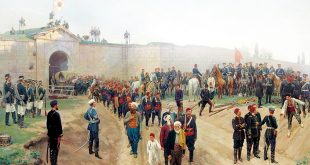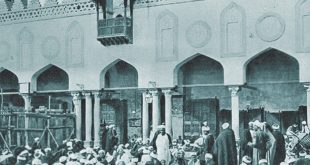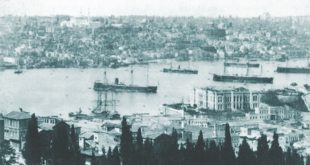In previous parts it was mentioned how Abdul Hamid II was one of the Ottoman sultans that had to rule his lands largely under the pressure of the British deep state. This is why his rule saw one of the sharpest declines the Ottoman Empire had ever experienced, both physically and spiritually. Sultan Abdul Hamid II was, in a way, a prisoner confined to Yıldız Palace. He couldn’t escape being ensnared by the British deep state plots. During his rule, the British deep state did everything in its power to spread not only the Darwinist propaganda but also to accelerate moral degeneration. During his reign;
 |
The first rakı (a Turkish alcoholic drink) and beer factories in the Ottoman Empire were opened,
The number of brothels skyrocketed, which caused a sharp increase in adultery,
The Ottoman Empire began to export wine to European countries,
Gambling became widespread.
Furthermore, during his rule, the Empire became completely reliant upon the West, especially after the establishment of the Ottoman Public Debt Administration. More importantly however, the Islamic world was divided. Many riots broke out across the Ottoman lands during this time, for which the primary reason purported by the British deep state was that the Caliphate had strayed away from Islam and that the center of Caliphate was degenerating Muslim societies.
The First Ottoman Rakı and Beer Factories Open
Bomonti Brothers opened the first beer factory of the Ottoman Empire in Istanbul during the reign of Abdul Hamid II. Olympus Brewery was also set up in Thessaloniki. Abdul Hamid II personally signed the licenses of these facilities. Bomonti beer factory produced seven million liters of beer every year, which later reached ten million liters. ‘Bomonti Beer Gardens’ were built along the way that stretched from Thrace to Eskişehir, so that local people could drink beer.
 |
|
| 1. License to open the beer factory, 1894 | 2. Bomonti beer factory set up by Swiss Bomonti brothers in Feriköy in 1890 |
An advertisement of Bomonti beer read as follows:
If you wish to quench your thirst, and don’t wish to drink the germy water, drink Bomonti beer instead. Home delivery is available in Istanbul.124
During the reign of Abdul Hamid II, beer consumption in Istanbul and its vicinity increased so much that trains began to carry fresh beer from as far away as Vienna. Abdul Hamid II imposed taxes on alcohol and issued the Alcoholic Beverage Regulations. This regulation dated April 7, 1886, stipulated the taxes to be collected for alcoholic drinks, while another regulation dated July 14, 1890, set the quality standards and the taxes for the wine to be exported.
 |
|
| 1. Bomonti beer factory in Istanbul | 3. Commercial poster for Bomonti beer. Note Abdul Hamid II’s seal on the poster. |
Abdul Hamid II’s involvement in alcoholic drink regulations and the corresponding taxes is important because he was the ‘Islamic Caliph’. His role in such practices was a clear indicator of the grim situation the Ottoman Empire found itself in, not to mention the intense pressure of the British deep state. The expense ledgers of the Yıldız and Dolmabahçe Palaces show wine, champagne and other drinks were bought for the palace, too.
The first rakı factory of Turkey was opened during the rule of Abdul Hamid II at Umurca Farm in Çorlu. This farm belonged to the Sarıcazade Ragıp Pasha, the head chamberlain of the Sultan and the Minister of Finance. Umurca Rakı quickly became very popular and taxes collected from the sales of this rakı became the most important item in the tax class called Rüsum-u Sitte (‘The Six Indirect Taxes’, named so because it consisted of six different taxes designated to pay off the debts of the Sublime Porte).
The aforementioned weren’t the only rakı factories opened during Abdul Hamid II’s rule. The town of Fertek in Niğde was producing Fertek Rakı. Brands like Boğaziçi, Ruh and Alem were competing to get the top spot in the rakı market. During Abdul Hamid II’s rule, which was a time even the palace staff was producing rakı, Deniz Kızı Rakı, also known as Tenedos Rakı, became very popular. Üzüm Kızı Rakı was another popular rakı brand and was usually known as ‘the rakı with the girl’ due to its advertisement posters.
Abdul Hamid II issued another decree and permitted the production of the Greek version of rakı, known as ‘ouzo’, in Pergamum.
 |
| Beer advertisements that were very commonplace during the reign of Abdul Hamid II. The above advertisement reads: “The tastiest, the most delicious beer: Bomonti beer. 1,800,000 liters of beer is produced daily in Feriköyü factory. Tasty, fun, thirst quenching” |
 |
| Rakı advertisements that became widespread after the foundation of rakı factories during the reign of Abdul Hamid II |
Wine Production and Export during the Reign of Abdul Hamid II
In 1889, vineyards were set up on a land in Erenköy, Istanbul on a 70-hectare land. During the rule of Abdul Hamid II, the Sultaniye vineyards in the Aegean region were used to produce grapes for wine production, which would later be exported to Europe.
When European vineyards started going bad, the whole of Europe, particularly France, turned to the Ottoman Empire, to meet the demands for wine. During Abdul Hamid II’s reign, wine exports skyrocketed to 340 million liters by 1904. Wine advertisements were to be found in the Ottoman newspapers, while promotional signs for Martel cognac could be seen all around Istanbul.
Ottoman cognacs distilled by Kotroni Efendi of Erdek entered competitions in Paris and won awards. Again, the first champagne factory was opened in the Ottoman Empire when Abdul Hamid II was the Sultan.
 |
| Advertisements for Üzüm Kızı rakı and other rakı brands produced in the Ottoman Empire |
Alcohol production and consumption increased so much during Abdul Hamid II’s time, the 34th chapter of Ayşe Fahriye Hanım’s famous cookbook Ev Kadını (The Housewife), which was first published in 1883, gave recipe for homemade rakı. The readers were given detailed descriptions of the production methods for two different types of rakı (seasoned with mastic and regular rakı) with a side note that fermented grape juice and wine could also be produced using the same setup.
According to journalist Ahmet Cemaleddin Saraçoğlu, ‘… the rule of Abdul Hamid II provided a massive tavern to citizens’.126
Alcohol is a very harmful substance, not to mention that Muslims are forbidden from drinking it. God says in a verse:
O you who have believed, indeed, intoxicants, gambling, [sacrificing on] stone alters [to other than God], and divining arrows are but defilement from the work of satan, so avoid it that you may be successful. (Qur’an, 5:90)
 |
| Wine production in the Ottoman Empire first started in 1889. By 1904, total export volume had reached 340 million liters. |
Of course, every individual has the right to live their lives the way they wish. The above historical details are in no way to be construed as interfering in people’s choices. However, they are important in that they show how the production, sales and export of alcoholic beverages in a Muslim country, with the permission of the Islamic Caliph, set the stage for the moral decline in society and shook the trust of the Islamic world in the Caliph. Even though certain circles maintain that alcoholic drinks were produced for non-Muslims at the time, it is clear that not as many non-Muslims were living on Ottoman lands at the time that would be able to consume millions of liters of alcoholic drinks. In any case, many photographs taken during those days clearly show Ottoman Turks drinking alcohol at beer houses.
 |
| Alcoholic beverage production increased so sharply during the rule of Abdul Hamid II, journalist Ahmet C. Saraçoğlu compared this period to ‘a massive tavern.’ |
Brothels Open and Prostitution Spreads in the Ottoman Society
One of the least-known facts about the reign of Abdul Hamid II is that it is when the first official brothel in the Ottoman Empire was opened upon a letter of instruction by the Caliph Abdul Hamid II. There is no doubt that prostitution was among the principal factors behind the moral decline that took place in the Ottoman society, laying the groundwork for the Empire’s fall. At this point, we should remember that Sultan Abdul Hamid II was under intense pressure from the British deep state, as a result of which he put into action the British deep state’s plan regarding brothels.
With a letter of instruction by Abdul Hamid II in 1884, the first brothel was opened on Abanoz Street, and was followed by other brothels in Zürefa Street. The brothels that are still active today in Zürefa Street were opened during Abdul Hamid II’s rule. In a short period of time, the number of brothels in Galata alone reached a hundred.
The situation became so grim that at one point, ships started to bring patrons for brothels from Europe and Russia to Istanbul. Most of the time, an important duty of the tour guides would be taking the patrons to Zürefa Street.
According to Ottoman archives, during this time, 2,125 prostitutes operated with official licenses; however, the number of those without official licenses was much higher. Brothels were not only in Galata and Karaköy, but also in Üsküdar. Bursa and Izmir also had their own brothels. Furthermore, during the reign of Abdul Hamid II, prostitutes were also brought from Poland, Romania, Austria and Galicia.
 |
 |
| In 1884, with instructions from Abdul Hamid II, the first brothel was opened in Abanoz Street, followed by others on Zürefa Street, which are still active today. In a short period of time, Galata alone became home to one hundred brothels. |
During the rule of Abdul Hamid II, prostitution became so widespread, Samuel Cohen, Secretary of the Jewish Association for the Protection of Girls and Women, wrote the following grim lines about the situation:
Behind the line of docks there runs a long street called Galata Street. … Most of the alleys were dedicated to brothels. I thought that the sights I witnessed in Rio de Janeiro were bad, but these brothels in Constantinople beggar description. The inmates of the brothel are seated on low stools or on boxes or on low couches, with almost nothing on in the way of clothes. … Some [prostitutes] stood at the doors or walked about in the rooms in a semi-naked condition, others had dressed themselves somewhat and were walking about the streets paying visits to other houses. … In the vicinity of these houses are cafes and drinking saloons, and in almost every one gambling is going on incessantly. … Everything appears as free and as licentious as possible. There are no hindrances and no difficulties from the authorities. … At one house in particular where the performance commences near midnight and goes on till 4.30 in the morning, the scenes are really disgraceful.127
The opening of brothels upon the instruction of Abdul Hamid II, in a way, turned the Ottoman Empire into a center of prostitution in a short amount of time and adultery spread like wildfire. This allowed the British deep state to achieve its goal to a large extent, which was morally degenerating the Ottoman Empire in order to hasten up its destruction.
Tobacco Factories Open during the Reign of Abdul Hamid II
Tobacco entered Ottoman society in the 1600s. However, almost every Sultan showed considerable effort to block its spread. The measures they took against this substance, which has been shown by medical research to be highly toxic to human body, were necessary and rational. However, things changed when Abdul Hamid II took over. Since he was under intense pressure from the British deep state, he stopped the anti-tobacco measures. Many tobacco factories were opened during his reign. Before his reign, only small shops were producing tobacco, but as soon as the new factories were opened, tobacco use spread quickly. The increased consumption sped up the physical and spiritual breakdown of the Ottoman Empire, especially after the aforementioned mistakes made during Abdul Hamid II’s reign.
 |
| Cibali tobacco factory |
 |
| Factory workers |
During his reign, the Cibali and Samsun tobacco factories were opened in 1884 and 1887 respectively. Samsun tobacco factory produced 60,000 kg of cigarettes and 400,000 kg of tobacco every year between 1887 and 1897. By 1905, the production capacity of the factory has reached one million kg. After a while, Izmir, Adana, Samsun and Istanbul became the most important tobacco production and processing centers.128
 |
| (1) Famous American cigarette brand Ateshian used the following slogan in its advertisements: ‘The cigarret smoked by His Imperial Majesty Abdul Hamid II, Sultan of Turkey’.
(2) A cigarette advertisement from the Abdul Hamid II era |
Instead of fighting to prevent the production and use of this substance, which is lethal for humans, which caused physical and spiritual degeneracy in Turkish youth and wasted away the energy of the nation, Abdul Hamid II continuously encouraged its use. He himself was a tobacco addict. This harmful habit of his is a well-known historical fact, confirmed by many accounts. So much so, his infamous smoking habit was known in even as far away as America. His favorite cigarette was the American ‘Ateshian’. This prompted the company to use in its advertisements the slogan ‘The cigarret smoked by His Imperial Majesty Abdul Hamid II, Sultan of Turkey’.
 |
 |
 |
| In later Ottoman years, hookah use also increased just like cigarettes. |
İbrahim Peçevi, one of the most prominent chroniclers of the Ottoman Empire, explained how the British introduced tobacco to the Ottoman Empire in his two-volume book Tarih-i Peçevi (Peçevi’s History):
The British brought [tobacco] to the Ottoman Empire around 1900 [1600 in Gregorian calendar] and sold it with the claim that it could heal some ailments. Some pleasure-seeker friends became addicts. However, in time, even those people who weren’t pleasure-seekers started to consume it. Even many great scholars and statesmen got addicted to smoking… Coffee houses were thick with smoke because all the wasted people and womanizers were there chain-smoking. Even on the streets and marketplaces, they were smoking.129
As one can see, it was the British deep state that first introduced tobacco and spread its use in the Ottoman Empire. The members of the deep state made the people addicted to this poison with lies that it would help cure ailments. When the rule of Abdul Hamid II started, another step was made that would help the British deep state. Abdul Hamid II transferred the tobacco revenues to the ‘Régie Company’, owned by French and British for 30 years, starting in 1883. So, not only were tobacco factories were opened to produce products that would poison Turkish people, the profit from the poison sold went to the British deep state. Again in his reign, the Régie Company was allowed to have its own armed guards, who heavily oppressed the Turkish people.
Footnotes:
124. Prof. Dr. Ercan Eren, Geçmişten Günümüze Anadolu’da Bira [Beer in Anatolia, From Past to Present], Tarih Vakfı, 2005
125. Prof. Dr. Ercan Eren, Geçmişten Günümüze Anadolu’da Bira
126. Ayşe Hür, “Meyhaneye Gel, Kim Ne Riya Var Ne Mürai…” [Come to the Tavern, No Hypocrisy, No Trickery], Radikal, May 26, 2013, http://www.radikal.com.tr/yazarlar/ayse-hur/meyhaneye-gel-kim-ne-riya-var-ne-murai-1134981/
127. Sal Cohen, Report of An Enquiry Made in Constantinople on Behalf of the Jewish Association for the Protection of Girls and Women, London, 1914, pp. 6-9
128. Filiz Dığıroğlu, “Selanik Ekonomisinde Unutulmuş Bir Alan: Tütün Üretimi, Ticareti ve Reji (1883-1912)” [A Forgotten Field in the Economy of Salonica: Tobacco Production and Trade, and the Régie (1883-1912)], p. 235, http://www.isam.org.tr/documents/_dosyalar/_pdfler/osmanli_arastirmalari_dergisi/osmanl%C4%B1_sy43/2014_43_filiz_digiroglu.pdf
129. Fehmi Yılmaz, “Tütünün Macerası II” [The Adventure of Tobacco], Tombak, p. 34, (October 2000), p. 25; İsmail Arslan, “İngiliz Konsolos Raporları Işığında XIX. Yüzyıl Ortalarında Drama Sancağında Tütün Yetiştiriciliği ve Ticareti” [According to the British Consulate Reports Tobacco Cultivation and Trade in the Sanjak of Drama during the Mid 19th Century], 2009, p. 115, http://www.turkishstudies.net/sayilar/sayi16/arslanismail1061.pdf
 British Deep State MASTERMIND: THE TRUTH OF THE BRITISH DEEP STATE REVEALED
British Deep State MASTERMIND: THE TRUTH OF THE BRITISH DEEP STATE REVEALED



